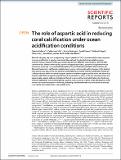Files in this item
The role of aspartic acid in reducing coral calcification under ocean acidification conditions
Item metadata
| dc.contributor.author | Kellock, Celeste | |
| dc.contributor.author | Cole, Catherine | |
| dc.contributor.author | Penkman, Kirsty | |
| dc.contributor.author | Evans, David | |
| dc.contributor.author | Kroger, Roland | |
| dc.contributor.author | Hintz, Chris | |
| dc.contributor.author | Hintz, Ken | |
| dc.contributor.author | Finch, Adrian | |
| dc.contributor.author | Allison, Nicola | |
| dc.date.accessioned | 2020-08-06T12:30:02Z | |
| dc.date.available | 2020-08-06T12:30:02Z | |
| dc.date.issued | 2020-07-30 | |
| dc.identifier | 268563390 | |
| dc.identifier | a19103d2-2a3c-43a9-9feb-0442543fa370 | |
| dc.identifier | 85088793131 | |
| dc.identifier | 000559797100015 | |
| dc.identifier.citation | Kellock , C , Cole , C , Penkman , K , Evans , D , Kroger , R , Hintz , C , Hintz , K , Finch , A & Allison , N 2020 , ' The role of aspartic acid in reducing coral calcification under ocean acidification conditions ' , Scientific Reports , vol. 10 , 12797 . https://doi.org/10.1038/s41598-020-69556-0 | en |
| dc.identifier.issn | 2045-2322 | |
| dc.identifier.other | ORCID: /0000-0002-3689-1517/work/78527525 | |
| dc.identifier.other | ORCID: /0000-0003-3720-1917/work/78527896 | |
| dc.identifier.uri | https://hdl.handle.net/10023/20415 | |
| dc.description | Funding: Leverhulme Trust (Research project grant 2015-268 to NA, RK, and KP) and the UK Natural Environment Research Council (NE/G015791/1 to NA and AF). | en |
| dc.description.abstract | Biomolecules play key roles in regulating the precipitation of CaCO3 biominerals but their response to ocean acidification is poorly understood. We analysed the skeletal intracrystalline amino acids of massive, tropical Porites spp. corals cultured over different seawater pCO2. We find that concentrations of total amino acids, aspartic acid/asparagine (Asx), glutamic acid/glutamine and alanine are positively correlated with seawater pCO2 and inversely correlated with seawater pH. Almost all variance in calcification rates between corals can be explained by changes in the skeletal total amino acid, Asx, serine and alanine concentrations combined with the calcification media pH (a likely indicator of the dissolved inorganic carbon available to support calcification). We show that aspartic acid inhibits aragonite precipitation from seawater in vitro, at the pH, saturation state and approximate aspartic acid concentrations inferred to occur at the coral calcification site. Reducing seawater saturation state and increasing [aspartic acid], as occurs in some corals at high pCO2, both serve to increase the degree of inhibition, indicating that biomolecules may contribute to reduced coral calcification rates under ocean acidification. | |
| dc.format.extent | 8 | |
| dc.format.extent | 1318297 | |
| dc.language.iso | eng | |
| dc.relation.ispartof | Scientific Reports | en |
| dc.subject | Coral | en |
| dc.subject | Biomolecules | en |
| dc.subject | Ocean acidification | en |
| dc.subject | GE Environmental Sciences | en |
| dc.subject | DAS | en |
| dc.subject | SDG 14 - Life Below Water | en |
| dc.subject.lcc | GE | en |
| dc.title | The role of aspartic acid in reducing coral calcification under ocean acidification conditions | en |
| dc.type | Journal article | en |
| dc.contributor.sponsor | NERC | en |
| dc.contributor.institution | University of St Andrews. School of Earth & Environmental Sciences | en |
| dc.contributor.institution | University of St Andrews. Scottish Oceans Institute | en |
| dc.contributor.institution | University of St Andrews. St Andrews Isotope Geochemistry | en |
| dc.contributor.institution | University of St Andrews. Marine Alliance for Science & Technology Scotland | en |
| dc.identifier.doi | 10.1038/s41598-020-69556-0 | |
| dc.description.status | Peer reviewed | en |
| dc.date.embargoedUntil | 2020-07-30 | |
| dc.identifier.grantnumber | NE/G015791/1 | en |
This item appears in the following Collection(s)
Items in the St Andrews Research Repository are protected by copyright, with all rights reserved, unless otherwise indicated.

